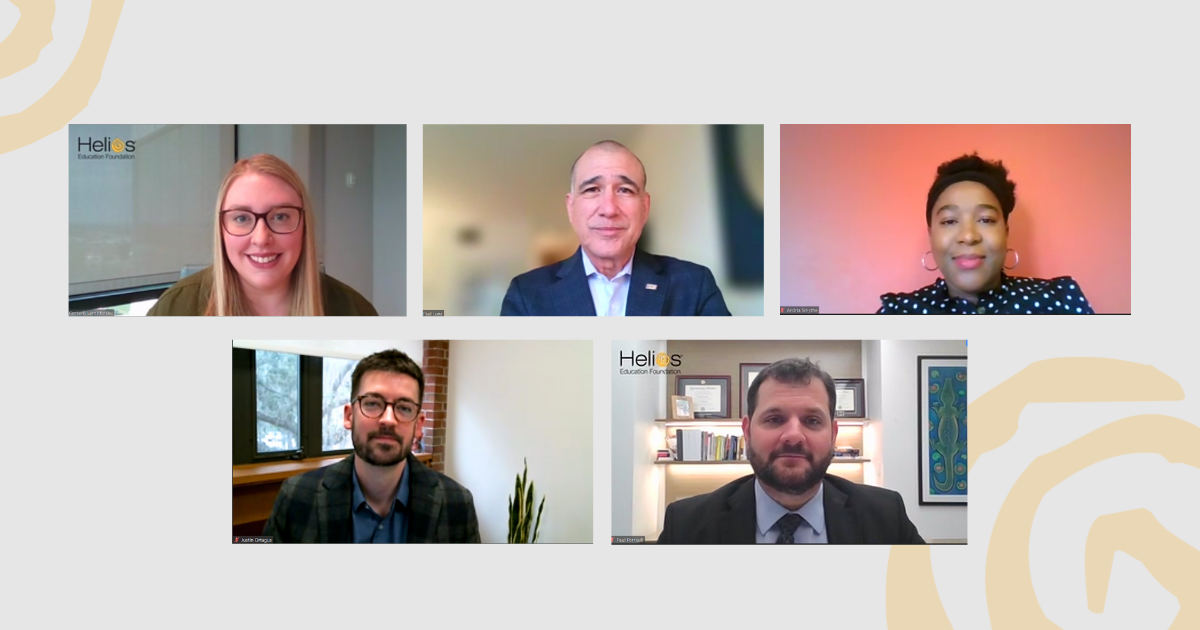Webinar: The upside of college enrollment for Black Florida students
Academic experts share insights on benefits of increasing college enrollment among Black Florida students
Black student success took center stage in a recent Helios Education Foundation webinar. The conversation revolved around a two-part research report that focused on 97,000 Black Florida students who took the SAT between 2004 and 2010. Released in December 2023, the Helios report reveals a significant financial advantage for Black Florida students who chose to enroll in a college or university, compared to their counterparts who did not pursue higher education.
“We had the fortune to work on one of the largest and richest student level datasets in the U.S.,” said Kimberly Lent Morales, director of research and evaluation of Helios. “It allowed us to follow Black students who graduated from Florida high schools through college and then track their financial outcomes around age 30. We looked at success points beyond the degree completion, which is often the end of what most people talk about.”
Here are some key findings from the research:
- Starting at a four-year institution raises the probability of Black students earning a bachelor's degree by 42.9 percentage points compared to student who did not initially enroll in college.
- Four-year college students see a net present value of $130,000 after 35 years from initial enrollment, while two-year college students see a net present value of $50,000 35 years after 35 years from initial enrollment.
- The average estimated household earnings for Black students within the study are projected to be $8,583 higher than those same students who did not enroll in college.
- Relative to individuals who do not enroll in college, two-year college students are expected to see an increase in annual average household earnings of $6,492.
- Enrolling in college also increases the probability of the students earning more than the 50th percentile of earners in Florida by 2.9 percentage points for two-year college enrollees and 10.4 percentage points for four-year college enrollees.
Justin C. Ortagus, Ph.D., associate professor at the University of Florida College of Education, underscored the importance of the study allowing students time to graduate from college and settle into employment.
“Oftentimes, whenever you think about the students who are reticent, or students who are really on the margins of thinking about whether college makes sense, they're disproportionately low-income students, racially, minority students, and oftentimes that's tied to debt aversion and being nervous about the idea of taking out student loan debt to pay for college,” said Dr. Ortagus. “Setting aside that college is unequivocally a really good investment, in this study we're very clear about net present value when accounting for the loan debt that one takes on and giving students enough time to enter the labor market.”
Exploring the value of HBCUs
A portion of the webinar was focused on the value of Historically Black Colleges and Universities (HBCUs). The study found a compelling statistic, revealing a 40% increase in the likelihood of a Black student attaining a bachelor’s degree when enrolled at an HBCU compared to those who enroll at predominately white institutions.
“We’re also seeing HBCU enrollment increases the probability that an individual’s earnings will end up at a higher point on the income distribution,” said Andria Smythe, assistant professor of economics at Howard University, during the webinar.
She went on to state that these higher incomes from HBCU graduates directly translate to higher rates of consumer spending and consumption that are all positive economic benefits to Florida.
Paul Perrault, Ph.D., senior vice president, community impact and learning of Helios, shared a list of policy implications for Florida that he challenged education champions to consider.
“Number one, investing to increase college attendance—especially in-state college attendance—among Black high school students should be an economic priority,” Dr. Perrault said. “If they go to college they tend to live in Florida after graduation and it adds to the economic cycle.”
Following Q&A from attendees, Paul J. Luna, president and CEO of Helios, closed the event emphasizing the importance of community engagement, public policy, and shared learnings. “We look forward to continuing to engage with you. Partnership is one of our fundamental beliefs in how we do our work.”


